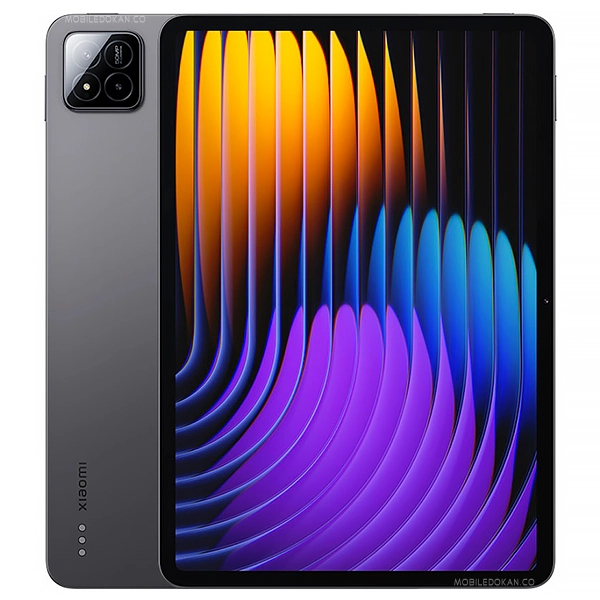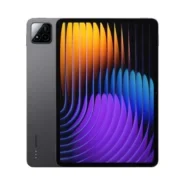Xiaomi Pad 7



-
CPU: Octa-core
-
RAM: 8 GB, 12 GB
-
Storage: 128 GB, 256 GB
-
Display: 11.2 Inches
-
Camera: Rear 13 MP ( f/2.2) Front 8 MP ( f/2.3)
-
OS: Android 15 Hyper OS 2
Xiaomi Pad 7 Overview
Xiaomi Pad 7 was launched on 29 October, 2024. It comes with a 11.2-inch IPS LCD display which supports resolution of 2136 x 3200 pixels at ~344 pixels-per-inch.
The Xiaomi Pad 7 is powered by Octa Core Qualcomm Snapdragon 7+ Gen 3 processor and Adreno 732 GPU. It offers 8GB / 12GB RAM and 128GB / 256GB storage options. The phone runs HyperOS 2 on top of Android 15 operating system.
As regard camera quality, the Xiaomi Pad 7 boasts a single camera setup of 13 MP lenses on the rear side, while on the front side, it features a single 8 MP camera.
Xiaomi Pad 7 has a 8850-mAh battery and supports fast charging as well as wireless charging. It has no cellular connectivity option. It measures 9.89 x 6.83 x 0.24 inch (height x width x thickness) and weighs 500 grams.
Xiaomi Pad 7 Price in Pakistan
| Product Variant | Price |
|---|---|
| Xiaomi Pad 7 (128GB, 8GB RAM) | PKR 85,600 |
| Xiaomi Pad 7 (256GB, 8GB RAM) | PKR 98,700 |
| Xiaomi Pad 7 (256GB, 12GB RAM) | PKR 125,600 |
Specification
General
| Device Type | iPad |
| Model | Xiaomi Pad 7 |
| Announced | 29 October, 2024 |
| Released | 29 October, 2024 |
| Status | Available |
| Price Price in Pakistan | 85,600 |
Design
| Type <strong>Design Type</strong> called form factor refers to a mobile phone's size, shape, and style as well as the layout and position of major components of phone. There are three major form factors seen in mobile phones => bar phones, folding phones and sliding phones. | Bar |
| Dimensions | 9.89 x 6.83 x 0.24 |
| Weight | 500g |
| Colors | Blue, Black, Green |
Network
| 3G Network | |
| 4G Network | |
| 5G Network | |
| SIM <strong>SIM</strong> (Subscriber Identity Module) is a small card that contains mobile network subscriber's account information. This allows the phone using the card to attach to a mobile network. The SIM card is most commonly associated with GSM and UMTS mobile networks. Moving a SIM card from one phone to another allows a subscriber to switch mobile phones without having to contact their mobile network carrier. SIM cards can also be used by a phone to store limited amounts of data, such as phone numbers and text messages. | Standard SIM |
| Dual SIM |
Display
| Display Type <strong>Display Technology => </strong> A number of display technologies and types used in mobile phones => TFT (Thin Film Transistor), IPS (In-Place Switching), OLED (Organic Light Emitting Diode), AMOLED (Active-Matrix Organic Light-Emitting Diode), Super AMOLED (an even advanced version of AMOLED), Resistive Touchscreen (Resistive touchscreens contain two layer of conductive material with a very small gap between them which acts as a resistance), Capacitive Touchsceen (Capacitive touchscreen technology consists of a layer of glass coated with a transparent conductor) | IPS LCD |
| Size | 11.2 Inches |
| Resolution | 2136 x 3200 pixels |
| Display Colors <strong>Display Colors</strong> is refers to the number of different shades of colors that the screen is capable of displaying => 64K colors, 256K colors and 16 million colors, Obviously 16M is highest available range of colors and better than others. | HDR10+, 68 billion |
| Pixel Density <strong>Pixel Density (PPI)</strong> is refers to the concentration of pixels on a particular display, measured in pixels per inch (ppi). Pixel density is calculated by dividing the diagonal pixel resolution of a display by its diagonal size, higher pixel density better display quality. | ~344 |
| Touch Screen | Yes |
Camera
| Primary <strong>Camera</strong> is able to capture photographs and usually videos, The most important characteristics of a camera are the resolution (measured in megapixels), lens focus type (fixed or automatic), higher megapixel cameras are known to capture higher quality photos, but not always a good measurement of the photos quality. | Rear 13 MP ( f/2.2) Front 8 MP ( f/2.3) |
| Image | Yes |
| Video | Yes |
| Flash <strong>Flash Light => </strong> There is commonly two types of flash lights are used in camera mobile phones, LED Flash (LED flash offers lower power consumption with drive circuitry that takes up very little room, LEDs can be strobed faster than any other light source), Xenon Flash (xenon flash produces an extremely intense full-spectrum white light for a very short duration) | Yes |
Sensors
| Accelerometer | |
| Gyroscope | |
| Ambient Light | |
| Compass | |
| Fingerprint | |
| Proximity | |
| Barometer |
Hardware
| CPU <strong>CPU</strong> (Central Processing Unit) mostly known as processors, CPU processes instructions in order to carry out certain functions that make your device operate properly. Processors are often described as the brain of computers, smartphones and tablets, Smartphones and tablets rely on processors to carry out their every task, Processors are an incredibly important factor in selecting any type of computing device, including your smartphone. | Octa-core |
| GPU <strong>GPU</strong> (Graphics Processing Unit) is a single-chip processor designed to rapidly manipulate and alter memory to accelerate the creation of images in a frame buffer intended for output to a display, This includes things such as lighting effects, object transformations, and 3D motion. | Adreno 732 |
| RAM (Memory) <strong>RAM</strong> (Random Access Memory) is a type of computer memory that can be accessed randomly, any byte of memory can be accessed without touching the preceding bytes that allows information to be stored and accessed quickly from random locations. RAM is the most common type of memory found in computer systems, smartphones, tablets and other electronic devices. | 8 GB |
| Internal Storage <strong>Internal Storage</strong> is a data storage space (flash memory) mostly used in smartphones, tablets and other electronic devices where operating system, apps, music, photos, videos, files and other user data Is stored. | 128 GB, 256 GB |
Connectivity
| Bluetooth <strong>Bluetooth</strong> is a wireless communications technology for exchanging data between mobile phones, headsets, computers and other network devices over short distances without wires, Bluetooth technology was primarily designed to support simple wireless networking of personal consumer devices. | |
| Wi-fi <strong>Wi-Fi</strong> is a popular wireless networking technology using radio waves to provide high-speed network connections that allows devices to communicate without cords or cables, Wi-Fi is increasingly becoming the preferred mode of internet connectivity all over the world. | |
| Wi-fi Hotspot | |
| USB | |
| GPS <strong>GPS</strong> The Global Positioning System is a satellite-based radio navigation system, GPS permits users to determine their position, velocity and the time 24 hours a day, in all weather, anywhere in the world, In order to locate your position, your device or GPS receiver must have a clear view of the sky. | |
| HDMI <strong>HDMI</strong> (High-Definition Multimedia Interface) is a compact audio/video interface for transferring uncompressed video data and compressed or uncompressed digital audio data from a HDMI-compliant source device to a compatible computer monitor, video projector, digital television, or digital audio device. |
Battery
| Battery Type <strong>Battery Type => </strong> Cell phones run on various kinds of batteries depending on the manufacturer, phone size or shape and features. There are basically four types of cell phone batteries => Lithium Polymer, Lithium Ion, Nickel Metal Hydride and Nickel Cadmium. | Li-Ion (Lithium Ion) |
| Capacity <strong>Battery Capacity</strong> is a measure (typically in Amp-hr) of the charge stored by the battery, and is determined by the mass of active material contained in the battery. The battery capacity represents the maximum amount of energy that can be extracted from the battery under certain conditions. | 8850 mAh |